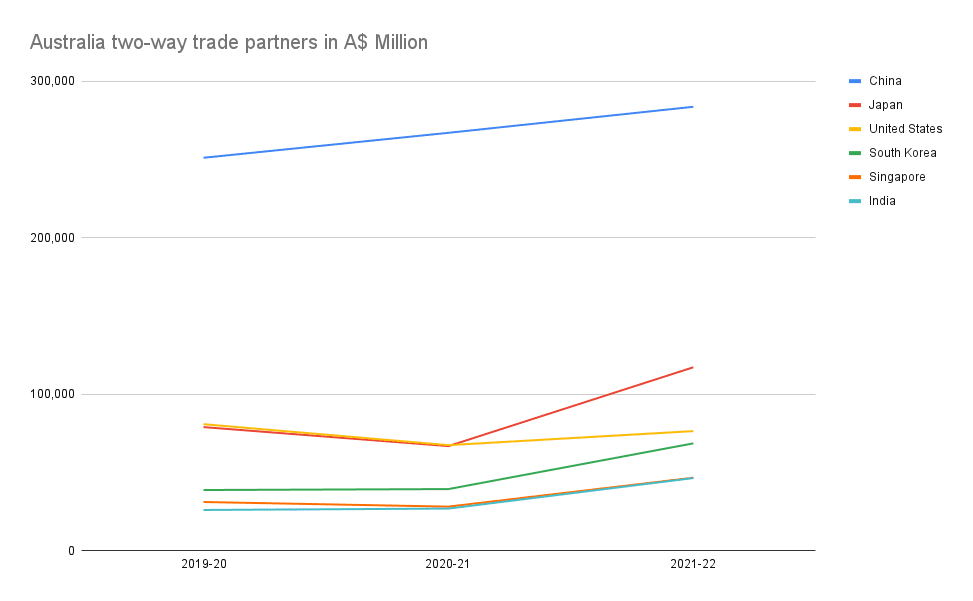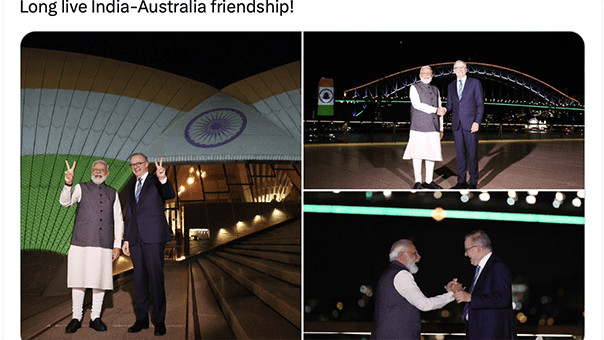Prime Minister Anthony Albanese met with his Indian counterpart Narendra Modi in Sydney on Wednesday and struck new agreements on migration and green hydrogen.
Prime Minister Modi was met with a cheering crowd of thousands in Sydney’s Olympic Park to welcome his second official state visit to Australia, the latest development in an ongoing trend of improving Australian and Indian ties. So far on the agenda for this visit was a new migration deal and a Green Hydrogen trade deal.
With PM @AlboMP in Sydney.
Long live India-Australia friendship! pic.twitter.com/2KuucGV0Y3
— Narendra Modi (@narendramodi) May 24, 2023
The new ‘Mobility Arrangement for Talented Early Professionals Scheme’ – or MATES – annually opens the door for three thousand of India’s top graduates and professionals to work in Australia for two years without needing to be sponsored by an employer. Once their stay has concluded they will be able to apply for work visas. This will encourage further migration from India to Australia, primarily of skilled workers, and strengthen what Modi has called the “living bridge” between the two countries.
“Our people-to-people contacts remain a strong pillar of our partnership. The Indian diaspora in Australia has increased over the past years,” Prime Minister Modi told The Australian, lauding the Indian diaspora in Australia.
According to the Bureau of Statistics; Indian-born Australians are the second largest demographic of foreign born Australians and the fastest growing in the entire country, currently sitting at seventy thousand people or just under 3 per cent of the total population. A number that has more than doubled over the past decade.
Likewise, languages native to India are becoming more widely spoken in Australia. Punjabi has become the sixth most spoken language, growing faster than any other language in the country.
Hinduism has also grown to become the third largest religion in Australia at just under 3 per cent, trailing behind Islam and Christianity.
The second half of the agreements made is the establishment of a Green Hydrogen Task Force. Hydrogen is an important chemical in manufacturing but it is not found naturally in nature so it needs to be separated from other substances. While Green Hydrogen is not a different chemical than regular Hydrogen, it is different in that it is produced in an environmentally conscious way and is renewable.
As part of this new agreement, Australia and India will work together to exchange technology and expertise in developing Green Hydrogen through a specialised task force.
“Investments like the taskforce will help power our industries in the future, and ensure that Australia and India meet our energy targets in the interests of both our respective countries, but also in support of reduction of global emissions,” Albanese said.
This agreement will improve Australia and India’s already close economic ties and continue a trend in the Australian economy pivoting away from China.
Currently India and Australia are signed on to the ECTA (Australia-India Economic Cooperation and Trade Agreement) agreement which makes 85 per cent of all Australian exports to India tariff free and inversely 96 per cent of all imports from India are tariff free.
Albanese and Modi in their recent meeting have promised that these ties will only improve and that by the end of this year with the signing of the CECA (Australia-India Comprehensive Economic Cooperation Agreement) agreement.

Source; Australian Bureau of Statistics
As part of deepening ties between Australia and India, Vice-Chancellor Professor Patricia Davidson met with Prime Minister Modi on the 12th of May and secured a license to open a teaching location in Gujarat International Finance Tec-City (GIFT City).
“In accordance with the strategic ambitions of both of our nations’ governments, the vision of UOW is to create a location for learning, research and industry collaboration that supports the mission of GIFT City, and provides an affordable Australian education within India, by a highly ranked and experienced global university,” Professor Davidson said.

